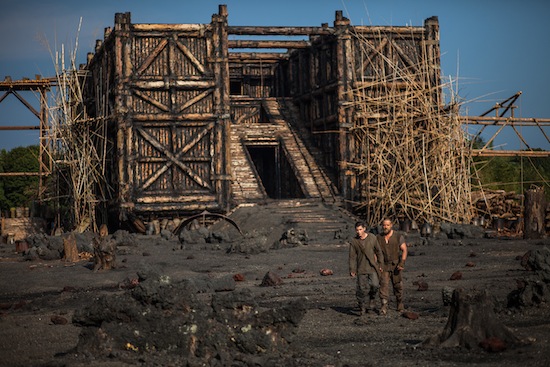This week, Jewish Addiction Community Services of Vancouver (JACS) is speaking across the community at various synagogues to help spread the word of how we can help those struggling with a substance use disorder. The talk centres around the weekly Torah portion, Noah, and what we can learn from it.
Who doesn’t know the story of Noah and the ark? Animals two by two, Noah saves the world.
The parashah (Torah portion) opens with: “Noah was a righteous man. He was perfect in his generation. Noah walked with God.” No wonder, then, that when God saw all the evil and sin and decided to “reboot” the system, He chose Noah as his agent on the ground.
But, there is a darker side to Noah’s personal story. The man we find at the end of the parashah is not the “perfect” man introduced to us at the outset.
The parashah tells us that, after the waters recede, the very first thing Noah does upon leaving the ark is plant a vineyard. And immediately thereafter: “He drank the wine and became drunk, and he uncovered himself in his tent.”
A casual read might lend itself to a wisecrack: after being cooped up with animals and no shower for so long, who wouldn’t crave a drink? We might chalk it up to a one-time overindulgence. But the rabbis tell us otherwise, that this digression from the central plot line is no accident. The parashah is drawing our attention to Noah’s misplaced priorities: instead of turning his energy to rebuilding and repopulating the world, his first priority was getting drunk. Thus, the rabbis consider Noah one of the first Jewish alcoholics.
And the story gets more distressing. Ham, Noah’s son, discovers his father passed out, and brings his two brothers into the mix as well, to cover their father’s naked body. The brothers are embarrassed, if not ashamed, to find their father in such a state. And, when Noah wakes up from his drunken stupor and pieces it all together, he is mortified. But instead of engaging in a moment of self-reflection, Noah channels his feelings into a rage and curses Ham and his descendants. In short, family chaos reigns, and shalom bayit (peace of the home) couldn’t be further from the truth.
This, then, is one of the earliest stories that gives rise to the saying that “addiction is a family disease” – it wreaks havoc on everyone. Through this lens, we might be tempted to judge Noah harshly for this significant failing. “How could he do such a thing?” “Did he not think of the consequences?” And, perhaps worst of all, “instead of taking responsibility for his actions he lashes out at his family? This is not OK!” At the extreme, in today’s world of uber political correctness, where cancel culture reigns, some might even be tempted to write off Noah altogether.
That said, yielding to the temptation to judge Noah would be missing the central point of the story. To be sure, Noah does not deserve a “free pass” on his behaviour, but questioning “how did this happen?” or “to what extent should we hold Noah accountable?” is of secondary importance. Far more important than “why did he do it” is “why are we surprised that he did?”
Noah was tasked by God with the responsibility for saving all species during the flood, and then repopulating the world thereafter. Is it any wonder he felt intense pressure? Let alone the significant possibility that, mixed with immense relief at being alive, Noah may have also suffered from a significant dose of survivor’s guilt.
We know that different people handle stress differently, and some end up resorting to coping mechanisms that are hugely self-destructive. Noah was in that camp. To be sure, he made some choices that ultimately led to his alcohol dependency, but, unfortunate as that may be, he was probably not the first to do so, and most certainly not the last.
At a Friday night service at Temple Sholom, Rabbi Dan Moskovitz, as part of his sermon, asked for a show of hands: how many in the sanctuary have been touched (self or a loved one) by substance abuse? The majority of hands went up. In short, our Jewish community is no different from any other subset of our world: far too many are afflicted by a substance use disorder.
This fact led to the formation a few years ago of JACS Vancouver. JACS’s mission is twofold.
First and foremost, JACS’s professional team helps individuals and their loved ones find a path to sustained recovery from substance abuse. If you or a loved one is struggling with substance abuse, JACS is here for you – no judgment, just support and a helping hand to navigate the system and get the resources you need to get better.
Second, JACS is dedicated to community awareness and education, striving to reframe the conversation around substance abuse disorders from judgment to compassion and support. To be clear, substance abuse disorder is a disease, not a choice: nobody sets out with intention to become drug- or alcohol-dependent. Yes, the individual’s path to acquiring a substance use disorder probably included some bad personal choices along the way, but how is that any different from a heart attack victim whose daily commute included hitting the Tim Hortons drive-through? Why do we judge the former, but organize meals and visits for the latter? And, of course, fear of being judged is a huge deterrent to reaching out for help.
Returning to Noah, the parashah is providing fair warning that none of us, not even the “a righteous man who walked with God” is guaranteed a smooth sailing through life (pun intended).
The Talmud teaches that “whoever saves one life saves the world entire.” What the parashah tells us is that Noah saved the world. What it teaches us is that it is our job by reaching out with compassion and understanding to help people save themselves.
For more information, visit jacsvancouver.com.
– Courtesy JACS Vancouver



